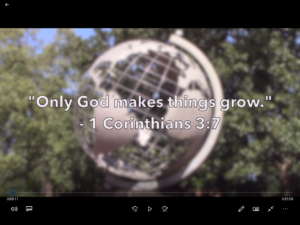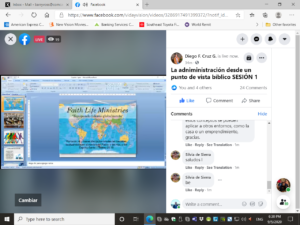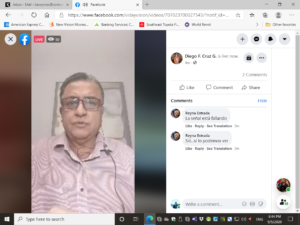
“When Jesus spoke again to the people, he said, “I am the light of the world. Whoever follows me will never walk in darkness, but will have the light of life.”
John 8:12
It is Christmas season around the world. Although Christmas is just one day, December 25th, people in many nations around the world love to celebrate the season beginning a month in advance. They love the colored lights, Christmas trees, celebrations, the exchange of gifts, and the general mood of kindness that seems to lift everyone’s spirits. This is true even as many of those nations no longer celebrate the birth of Christ, the reason for the season.
We live in a world where almost one third of its population is Christian. It has the most followers of any religion in the world. And yet Christians are the most persecuted religion on the earth as well according to a Pew Research Center survey in 2019. And according to a report released by Open Doors USA in 2019, 215 million Christians are persecuted for their faith, about 1 in 12 Christians in the world! And the levels of persecution continue to grow, even in the United States of America!
If the world loves Christmas, why is there such hatred for Christians in the world? Is it because we are the largest religion and need to be curtailed? Is it because we speak the truth of God’s Word that so often goes against the prevailing culture? Is it because Christians are a threat to governments and those in power? Or is it something more personal…?
The world’s calendar is divided between the time before Christ (BC) and the time after Christ (AD). Jesus’ birth was the most important day in history because it ushered in God’s physical presence in the world. And that single event has changed everything! Jesus’ life, death and resurrection revealed God’s love, grace and mercy for all mankind. It gave the world a hope it did not have before Jesus. It is no longer a question of wondering what God thinks or wants, it has become known to us through Jesus words, actions and obedience to God the Father. Jesus said, “If you really know me, you will know my Father as well. From now on, you do know him and have seen him.” (John 14:7).
And how did the world respond when Jesus was born? Those who recognized Him told others about Him and worshipped him (Luke 2:17-20). But those who feared Him tried to kill him (Matthew 2:16). And later, after Jesus began his ministry, the people who recognized Him praised him and followed Him (Matthew 21:9). But those who feared Him arrested him, beat him, and crucified Him like a criminal, though He had done no wrong (John 19:1 & 16).
It’s interesting to note that the same is true today. Nothing has changed. Those who recognize Him worship him, tell others about Him, and seek to follow His commands. But those who fear Him ridicule His followers, imprison them, beat them, and persecute them.
While governments persecute Christians because they are a threat to government control and power, people persecute them for a more personal reason. While Christians submit to the Lordship of Jesus Christ, others have no desire to submit to anyone other than themselves. They want to be rulers of their own lives. Jesus tells us to love our enemies (Matthew 5:43-44). But the world tells us to hate them and destroy them. Jesus says to turn the other cheek (Matthew 5:39). The world says to retaliate and hit back harder. Jesus says to give and it will be given to us (Luke 6:38). The world says only a fool gives away what he has earned for himself. Those who do not want Christ in their lives also do not want Christ in other’s lives either!
So, let us take a moment and imagine a world without Christ. What would it be like?
Well, we could look back before Christ was born and see what the world was like back then. It was a violent world where the strong dominated the weak. It was a world where there were no human rights. It was a world where most people died young. It was a world where one had to submit to the rulers and conquerors of the day. It was brutal, it was dangerous, it was dark, and it was hopeless.
We could look back 100 years and see the rise of communism and fascism that outlawed Christianity and forced belief in atheism and worship of the state and its leader (Stalin, Hitler, Mao). It resulted in the killing of millions of people who dissented (Jews, Christians & others) and enslaved millions more under state-run, oppressive governments (Soviet Union, China). It caused a massive global war that also resulted in the horrific and torturous deaths of many soldiers. For those who lived and suffered during those times, they were dark days indeed with little hope!
But we can also look around us and see what is happening today. Christian persecution is growing globally, dissenting voices are being silenced, the murder of unborn children through abortion is being lauded, communism is being revived, and government power is being used to restrict freedoms and control our lives.
Christ is needed today just as He was needed 2,000 years ago. Without Christ, the world becomes a dark and dangerous place. More importantly, without Christ, the human heart remains a dark and dangerous place as well! (Romans 1:21)
I, for one, do not want to see a world without Christ. Fortunately, that cannot happen. Jesus said, “And I tell you that you are Peter, and on this rock I will build my church, and the gates of Hades will not overcome it.” (Matthew 16:18). What Jesus has built cannot be destroyed. Wherever Christian persecution exists, the Church grows stronger. That’s what happened in the Soviet Union and China after World War II, and is now happening in Iran. So we should not lose heart. The Light of Christ cannot be extinguished!
So this Christmas, let us pray once again for the Light of Christ to lighten a darkening world. Let us pray for the Love of Christ to reign in people’s hearts. And let us pray for God’s Holy Spirit to lead the world to Christ and Him alone. For without Christ, our world would also be without hope! Let us bow down and worship Him this Christmas as the Magi from the East did 2,000 years ago (Matthew 2:11), and let us praise Him for the grace and mercy that He alone gave to us at the cross (Ephesians 2:8)!
















